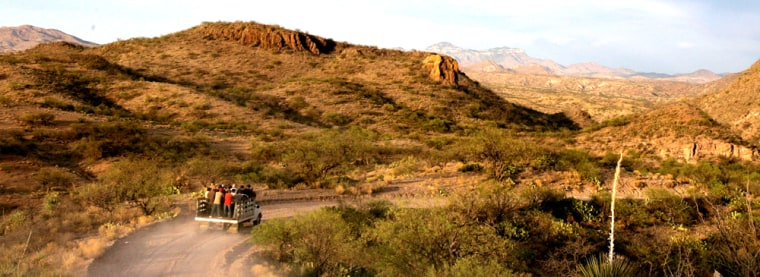Mexicans say it will take more than three layers of fence and 6,000 National Guard troops to keep them out of the United States.
As President Bush visited the stretch of Arizona desert Thursday that serves as a cactus-studded freeway for thousands of undocumented migrants, those preparing to make the perilous trip said they will find a way around almost any obstacle.
“We’ll go under it, we’ll go over it, we’ll go through the air, the sea or the earth, but they’re never going to stop us from crossing,” said Jesus Santana, a Tijuana truck driver who was caught trying to cross and deported.
Increased security will likely only serve to make smuggling fees more expensive and drive immigrants deeper into debt, making them even more desperate to make it north.
As a tired, bedraggled column of deportees filed across a Nogales border bridge Thursday — just as Bush was giving a speech on border security west of here — some migrants were already furiously dialing cell phones to contact immigrant smugglers for their next attempt.
“Of course we’ll cross again. We’re just waiting for them to come and pick us up,” said Javier Torres, 22, of Cuiliacan, Sinaloa. Just 100 yards away, vans of the kind used by smugglers waited under an underpass to pick up groups of deportees.
The deportees were greeted on the Mexican side by Martin Doriane, who for the last four years has surveyed returning migrants for the Colegio de la Frontera Norte.
Doraine says at least 95 percent of migrants caught and deported say they’ll try again, in part because they’ve sold everything they own in Mexico to pay increasingly expensive and sophisticated smuggling efforts to overcome tightened border security.
“They say, ‘I had a roof and a frying pan in Mexico, but I sold both to come north and went into debt, so what do I have to return to?”’ Doraine said.
Seeking ‘a different life’
One of the deportees, Maria del Carmen Valadez, brought her 12-year-old son, Julio Cesar Castaneda, on the dangerous two-day trek through the desert. The boy hungrily ate a taco Doriane gave him as his mother acknowledged “it is a risk” to bring a child on such a dangerous trip.
“I did it to give him a different life,” said Valadez, of Fresnillo in Zacatecas in northern Mexico. She said she’ll probably try to cross again, because in her hometown, “there’s nothing but poverty.”
That sense of desperation — and determination — is everywhere.
On Monday, a detained woman told agents she had left her 3-year-old son dead in the desert.
The proposed 370 miles of triple-layer fencing, approved by the Senate Wednesday, as well as Bush’s plan to send National Guard troops to play supporting roles in border enforcement, has raised tempers and tensions here.
“Somebody is going to start shooting, and then there will be problems between the two countries,” predicted Santana, the Tijuana truck driver.
Mexico airs concerns
Mexico’s government has expressed concern about the wall and National Guard proposals, saying they aren’t the way to solve problems of border security and illegal migration north.
“Most countries want to bring their people together and tear down physical, commercial and cultural barriers,” presidential spokesman Ruben Aguilar said Thursday. “Anyone who proposes separating them is out of line. Walls are a sign of distrust, and that will never be the basis of a good friendship between two countries.”
The Senate measure includes provisions that would give some undocumented immigrants a path toward citizenship and allow more people to work temporarily in the United States.
But Santana said he saw no advances in the sweeping reform package.
“There will always be more people wanting to come,” he said. “It will always be like this.”
